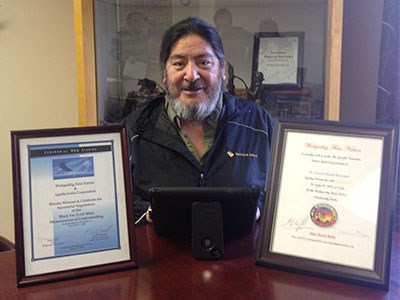Wahgoshig First Nation is open to doing business with resource companies, but one mining executive is off the list.
The community, located about 45 kilometres east of Matheson, is not interested in meeting with Darryl Stretch, president and CEO of Solid Gold.
The company began drilling on Wahgoshig's territory, about a kilometre from the community, in 2011. Chief Dave Babin said the company never informed the First Nation about its plans.
“We have values out in the territory and we want to make sure the industry realizes that,” Babin said.
In doing business with other resource companies, the First Nation has negotiated three impact benefit agreements so far, with others to be finalized in the near future, and has 17 memorandums of understanding.
Solid Gold failed to consult with the community, even after it was advised by the Crown to do so.
Wahgoshig took the company to court in early January, 2012, and a temporary injunction was granted by an Ontario Superior Court judge to cease exploration. The injunction was for 120 days.
Solid Gold was granted a leave to appeal and the Divisional Court of Ontario will hear the case in January, 2013.
“We have other agreements with companies and we are workable,” Babin said. “When companies work with First Nations, they start to understand the value of where we come from. We are not totally against development.”
Wahgoshig also has some community business ventures that can work in the resource industry on a partnership basis.
“We have a workforce that is being trained but we aren't asking companies to hire 100 per cent of our people. We are asking for opportunities and not numbers,” he said.
Stretch's main contention is that the duty to consult First Nations, when resource companies begin exploring and working on First Nations territory, lies with the Crown, and not on the companies. He said in a previous interview that he has a license and a contract with the Crown to do work on the properties. That license doesn't extend to “third-party governments,” whom he has referred to as “hostile” during a presentation in November 2012 at a mining symposium in Sudbury.
He also included, in his presentation, a cartoon image of First Nation people.
“When we staked our ground, in our view, that is a contract with the government and now the government is changing our contract whether we like it or not,” Stretch said. “And I am just not prepared to have somebody, who I am in contract with, come and change the rules and then force me to have to go and pay a third party.”
The judge's decision to grant Solid Gold's motion for leave to appeal stated, “I see no basis in the facts of this case for an imposition of a duty to consult on Solid Gold. If the Crown wishes to delegate operational aspects of its duty, it must establish a legislative or regulatory scheme. The mining act does not presently contain such a scheme.”
New regulations added to the province's mining act do not legislate companies to consult with Aboriginal communities but they are encouraged to do so, early in the exploration process. The new regulations will come into effect in the spring of 2013.
Babin said business cards and messages were left with Solid Gold's drillers, asking the company to meet with the community.
“He ignored the Crown's suggestion to hold off drilling until we come to the table and talk,” said Babin. “He actually brought in another drill and moved around in the territory.”
The two parties finally met, but the meeting lasted half an hour and the chief said Stretch had no intention of “doing any agreements.”
“We are open to resource companies coming in and we are not trying to stop them,” he said. “We want to make sure they come to the table and talk. We are here and companies have to start respecting what was here before they actually came over.”
Babin said certain areas of their territory are culturally sensitive, and it is important that their interests and values are protected.
“We have grave sites and we don't want to expose them because once we start doing that, people come around and start taking the artifacts away,” he said.
Stretch spoke about “native values” following his presentation in Sudbury and said, “What does that mean?”
“I know what arrowhead means and that is why I would use such a word and it is not my job to go hunt for arrowheads for those people.
“I use that word arrowhead because I want the public to understand what native values meant. But I was criticized rather heavily by various people for using that term.”
Babin said if Solid Gold came under new ownership, his community would be willing to meet.
“I am open to anything but not to a person like that.”




